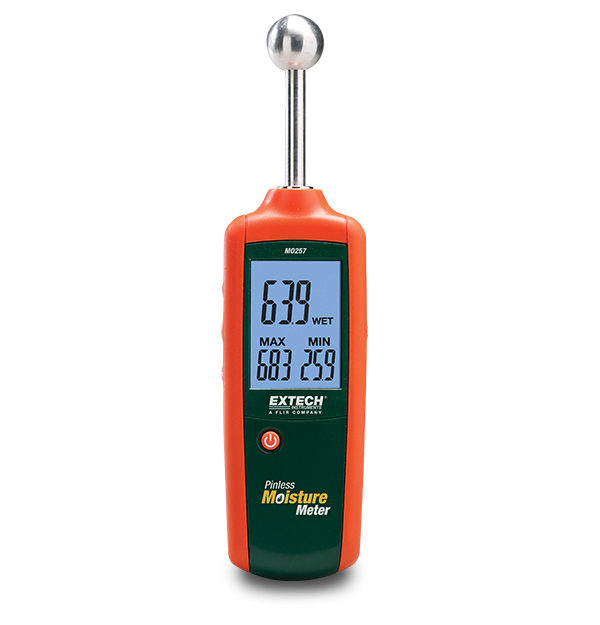Moisture Meter Reviews: Contrasting the most effective Versions for Specialist and DIY Usage
The Ultimate Overview to Dampness Meters: A Comprehensive Review and Just How They Can Conserve You Cash
Dampness meters serve as indispensable devices in identifying and keeping track of moisture content in materials, assisting in stopping expensive damages and making certain the top quality of products. Comprehending the subtleties of various kinds of moisture meters, their applications, and the prospective cost-saving benefits they use can be a game-changer for businesses and experts alike.
Kinds of Moisture Meters
One common type is the pin-type dampness meter, which measures the electrical resistance between two pins inserted right into a material. Pinless dampness meters, on the various other hand, usage electro-magnetic sensor plates to scan a larger area without triggering damage to the product's surface area.

Infrared wetness meters determine the thermal properties of a material to establish its dampness web content non-invasively, making them helpful for applications where pin or pinless meters might not be ideal. Understanding the different kinds of moisture meters offered can aid markets pick the most proper tool for their certain dampness measurement requirements.

Advantages of Using Dampness Meters
Dampness meters offer vital benefits in precisely assessing and checking dampness levels in diverse products and environments (Moisture Meter). One of the key benefits of making use of wetness meters is the prevention of potential damage brought on by excess wetness. By finding and resolving high wetness degrees at an early stage, dampness meters help to avoid mold development, rot, and structural damage in structures, saving both time and money on fixings. Furthermore, moisture meters help in ensuring the quality of materials during building and construction or manufacturing processes. By accurately measuring moisture web content, these devices aid keep the stability of wood, drywall, concrete, and other materials, decreasing the risk of failings or flaws.
In addition, using dampness meters can lead to increased energy performance. In agricultural settings, dampness meters play an important duty in enhancing plant yields by allowing farmers to monitor soil dampness levels and make educated irrigation choices.
Just How to Select the Right Dampness Meter
When picking a dampness meter, it's essential to make certain that the meter is appropriate for the particular material you will be screening. Different materials have differing electrical buildings that can impact dampness readings, so selecting a meter designed for your product is important for precise outcomes. By meticulously examining these elements, you can select a moisture meter that meets your demands and gives precise moisture measurements for your projects.
Proper Methods for Wetness Meter Usage

Price Financial Savings With Moisture Meter Applications
How can the calculated usage of moisture meters bring about significant price financial savings across various sectors? Moisture meters play a crucial function in expense financial savings by preventing prospective damage and ensuring quality control in various industries. In the agriculture market, wetness meters aid in determining the ideal time for collecting plants, avoiding over-drying or excess dampness that can influence the final item's quality. This specific monitoring helps farmers stay clear of unnecessary you can check here losses and optimize their yield.
Similarly, in construction, wetness meters help stop costly damages by identifying wetness degrees in building materials, such as wood or concrete, which can cause architectural issues if not resolved quickly. By identifying trouble areas at an early stage, service providers can take corrective actions to prevent substantial repairs or substitutes, ultimately conserving money and time.
Additionally, in the food handling sector, dampness meters are important for keeping an eye on item top quality and guaranteeing compliance with safety laws. By accurately determining dampness content in foodstuff, makers can prevent putridity, keep freshness, and minimize waste, resulting in substantial price financial savings. In general, the tactical application of moisture meters is a useful investment that can cause substantial expense check that decreases and enhanced performance across various industries.
Verdict
In final thought, moisture meters are valuable devices for determining and detecting dampness degrees in different products. By using the best wetness meter and adhering to appropriate strategies, customers can efficiently avoid costly damages caused by excess moisture.
Dampness meters offer as essential devices in discovering and monitoring moisture material in materials, assisting in preventing expensive damages and ensuring the high quality of items. Infrared wetness meters measure the thermal homes of a product to establish its wetness material non-invasively, making them useful for applications where pin or pinless meters might not be appropriate.Moisture meters provide very useful benefits in accurately evaluating and keeping an eye on dampness levels in varied products and atmospheres. In farming setups, dampness meters play a vital duty in enhancing crop returns by allowing farmers to monitor dirt wetness degrees and make notified watering decisions.In final thought, moisture meters are beneficial tools for finding and measuring moisture levels in different products.